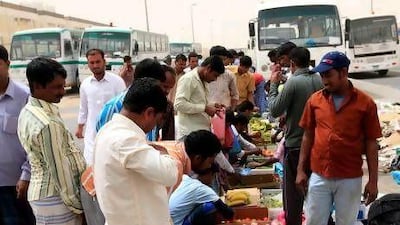Beer, whisky and betel leaves are on open sale, gamblers play cards for cash and there is no shortage of customers for illegal naswar chewing tobacco and cigarettes.
Welcome to Al Mafraq Workers City 2 on the outskirts of Abu Dhabi, popularly known as Baniyas labour camp and a law unto itself.
On Fridays the camp bustles with temporary, unlicensed market stalls. Some are innocuous, selling fruit, vegetables and clothes. But others offer alcohol, gambling, even illegal open-air haircuts.
Abu Dhabi Municipality is well aware of what goes on and sends inspectors to stamp out illegal activity - but when the inspectors leave, it starts up again. "Labourers who come here to earn, we don't want to fine them Dh500 for each offence as they earn generally Dh1,000," said Khalifa Al Romaithi, the municipality's head of health and sanitation.
"We consider these workers as new to the country and its culture, so we want to help them. Sometimes we fine them but first we inform them, then fine," Mr Al Romaithi said.
Nevertheless, the law continues to be broken. In front of Al Madinat supermarket in the camp, more than 20 people were offering haircuts for Dh5, and a shave for Dh3 - a third of the price in salons - for those prepared to sit in the heat.
"Salons are expensive," says J Prasad, an Indian labourer whose Dh700 does not stretch to expensive, but legal, haircuts.
Other sellers were offering cans of beer for Dh10 and bottles of whisky for Dh20. Legally, alcohol can be sold only at licensed outlets, and only to those with a licence to drink it. One seller was unsurprisingly reluctant to talk: "If you want to buy, take it - otherwise move ahead."
Elsewhere, a dozen or so men sat round a card table, with money changing hands as a card game progressed. All gambling is illegal. When The National tried to talk to them, the players immediately dispersed.
Several people were selling naswar chewing tobacco, which is illegal, and cigarettes, which can be sold only with a municipality permit.
K Alam, a Bangladeshi labourer who has lived at the camp for two years, said the tobacco was brought in and sold by workers who live there and were never stopped by the security guards. Abu At the municipality, Mr Al Romaithi says: "People at labour camps come from different nationalities where there are no specific laws and it's allowed.
"But here it's different. People cutting hair outside, selling naswar - we have received complaints about it."
A campaign is planned for this month, in which more than 1,000 brochures will be distributed in Hindi, Urdu, Bengali, Arabic and English.
But Mr Al Romaithi accepts that enforcement is difficult when workers' wages are so low.
And the low wages are causing many to think twice about staying. With a heavy heart, RK Singh, a duct fabricator, will return next month to his native India after three years in Abu Dhabi.
He says poor pay and lack of work have removed the reason for being here. "I don't have any problem here," he said, "but if I am unable to save some money for my family back home, then what is the point of staying?"
He earns about Dh1,200 a month, of which Dh300-400 goes on phone calls and other expenses - leaving him only Dh800 or so to send back. And he is doing well; many others manage to send Dh500 or less.
He is not alone in believing it may be time to leave. Many Indian workers say lack of pay rises or overtime is eating into their ability to send money to their families. And with the Indian economy booming, they believe their prospects may be better back home.
When M Choudhry first came here, four years ago, his visa cost him 80,000 rupees (Dh5,200). He earns Dh765 a month as a labourer. "I can earn more than this in India," he said.
"In the beginning there was much work and every day I got two to three hours' overtime. But now there isn't much work." Nevertheless, he says, the company he works for is good.
JC, an Indian welder, earns Dh2,000 a month. He, too, is planning to leave because "we are unable to save money here".
"The cost of living is very high," he said. "Now, the situation in India has changed and we can earn this amount there."
This is borne out by the number of Indians coming over, which the Indian embassy says has fallen "due to the fact that economy back home is booming". It does not, however, keep data about the number going back home.
The grass is not so green back in Bangladesh, though, and while the camp's Bangladeshis also struggle to send much money home, they have fewer complaints. "My only concern is the lower wages and expensive living cost here," says MM, a Bangladeshi cleaner. He paid 250,000 taka (Dh11,200) for his employment visa and earns Dh750 a month.
Mr Alam is in a similar financial position, but is happy with the camp - except for the food.
"They serve us the same food offered to Indians and we have to eat it against our will," he says, with evident distaste.
Mohammed Nazmul Quaunine, the Bangladeshi ambassador, said his government was working hard to stamp out unscrupulous agents.
"It's allowed for agents to take 120,000 to 130,000 taka for an employment visa," he said. "But charging more than this is wrong. We always strive to curb that."

